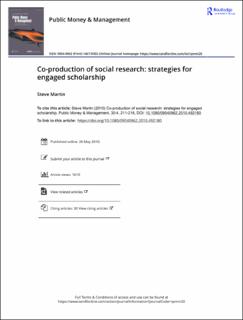| dc.contributor.author | Martin, Steve | |
| dc.date.accessioned | 2021-03-03T09:52:42Z | |
| dc.date.available | 2021-03-03T09:52:42Z | |
| dc.date.issued | 2010 | |
| dc.identifier.citation | Martin, S. (2010). Co-production of social research: strategies for engaged scholarship. Public Money & Management, 30(4), 211–218. | en_US |
| dc.identifier.uri | https://hdl.handle.net/11250/2731334 | |
| dc.description.abstract | There are incentives on both sides of the practitioner–academic divide for co-production of research. This article identifies and evaluates five strategies for achieving more engaged and engaging scholarship. At one end of the spectrum are models involving relatively low levels of involvement by practitioners, for example as the providers of data or passive recipients of research findings. At the other end, practitioners play an active role in commissioning, overseeing and learning from studies. Higher levels of engagement should enhance the prospects of utilization but may risk politicizing the research process. So it is important to be clear about the benefits of and barriers to different forms of co-production and to recognize what works best, in which circumstances and for whom. | en_US |
| dc.publisher | Public Money & Management | en_US |
| dc.subject | co-production | en_US |
| dc.subject | social research | en_US |
| dc.subject | engaged scholarship | en_US |
| dc.subject | innovasjon | en_US |
| dc.title | Co-production of social research: strategies for engaged scholarship | en_US |
| dc.type | Journal article | en_US |
| dc.source.pagenumber | 211-218 | en_US |
| dc.source.volume | 30 | en_US |
| dc.source.journal | Public Money & Management | en_US |
| dc.source.issue | 4 | en_US |
| dc.identifier.doi | https://doi.org/10.1080/09540962.2010.492180 | |
| dc.description.localcode | måsjekkes | |
